The Hate Crimes TTA Program resource library provides a collection of publications, lessons learned, available trainings, and useful links to valuable hate crime prevention resources.
Selected Options - Grid View
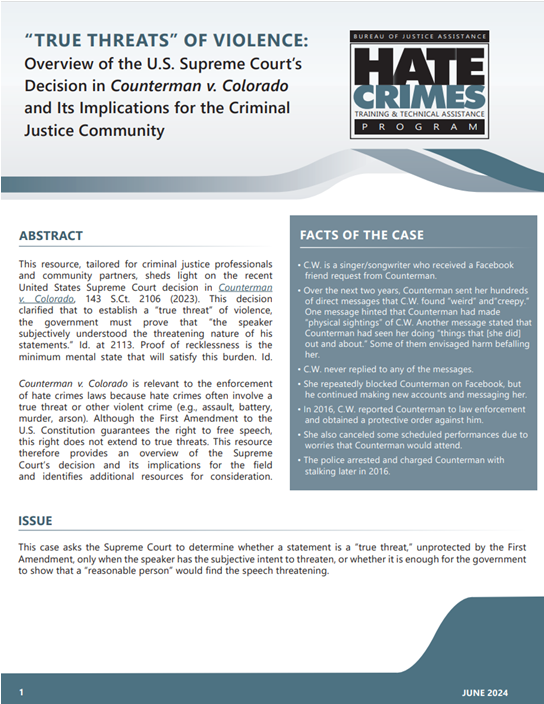
Overview of the Supreme Court Decision (Counterman v. Colorado)
This resource, tailored for criminal justice professionals and community partners, sheds light on the recent United States Supreme Court decision in Counterman v. Colorado, 143 S.Ct. 2106 (2023). This decision clarified that to establish a “true threat” of violence, the government must prove that “the speaker subjectively understood the threatening nature of his statements.” Id. at 2113. Proof of recklessness is the minimum mental state that will satisfy this burden. Id. Counterman v. Colorado is relevant to the enforcement of hate crimes laws because hate crimes often involve a true threat or other violent crime (e.g., assault, battery, murder, arson). Although the First Amendment to the U.S. Constitution guarantees the right to free speech, this right does not extend to true threats. This resource therefore provides an overview of the Supreme Court’s decision and its implications for the field and identifies additional resources for consideration.
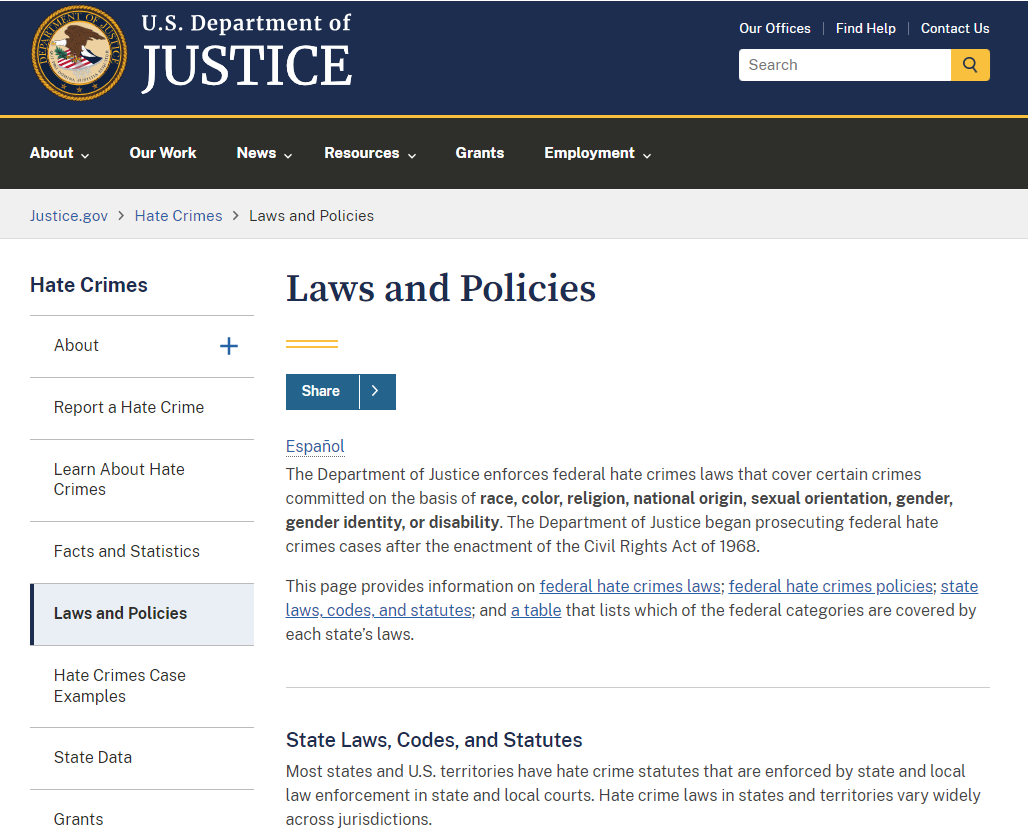
Hate Crimes Laws and Policies
This U.S. Department of Justice (DOJ) page provides information on federal hate crimes laws, policies, state laws, codes, and statutes, and a table that indicates which of the bias categories included in federal hate crimes laws are included in each state’s laws.
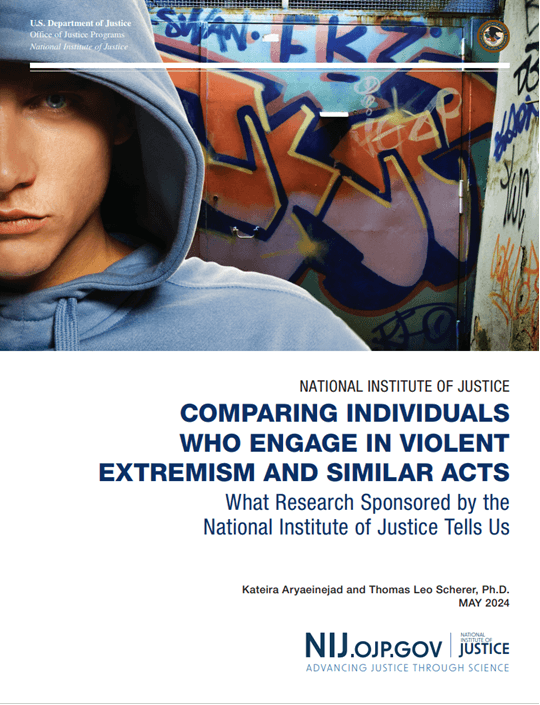
Comparing Individuals Who Engage in Violent Extremism and Similar Acts
The paper compares and contrasts data and findings from the National Institute of Justice (NIJ) –sponsored research projects on violent extremism, mass shootings, and bias crimes. The comparison examines both the content and creation/coverage of data from four research projects: the Profiles of Individual Radicalization in the United States (PIRUS) database, the Bias Incidents and Actors Study (BIAS) database, the National Hate Crime Investigation Study (NHCIS) database, and the Violence Project dataset.
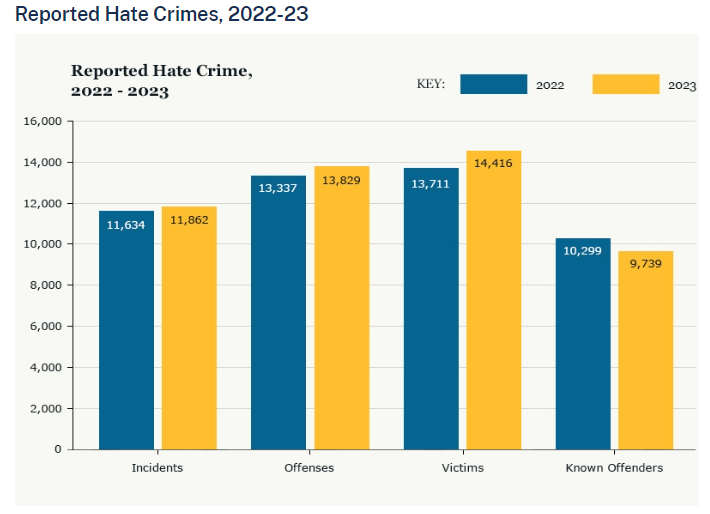
FBI Releases 2023 Hate Crime Statistics
The FBI's Uniform Crime Reporting (UCR) Program collects and compiles crime data from law enforcement agencies to provide reliable information for law enforcement management. In 2023, more than 16,000 agencies submitted hate crime data, reporting 11,862 incidents involving 13,829 offenses. The data includes details on the offenses, victims, offenders, and locations of these hate crimes.
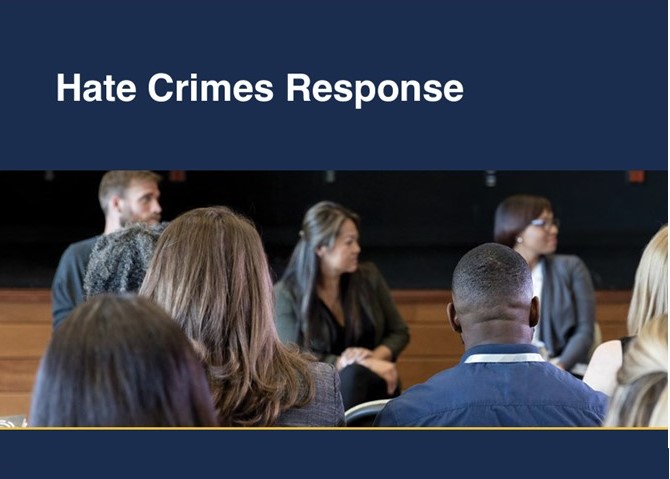
CRS Toolkit: Hate Crimes Response
This CRS toolkit details CRS programs and services to help communities' problem solve and build capacity to prevent and respond to hate crimes.
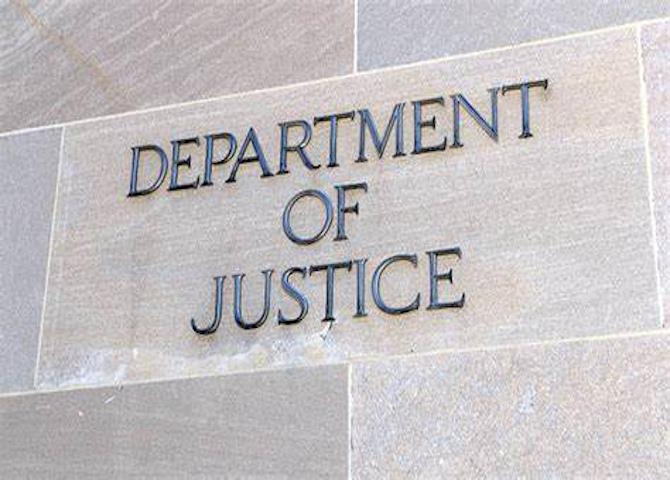
DOJ Hate Crimes Resources
Access a comprehensive collection of DOJ's hate crimes resources.
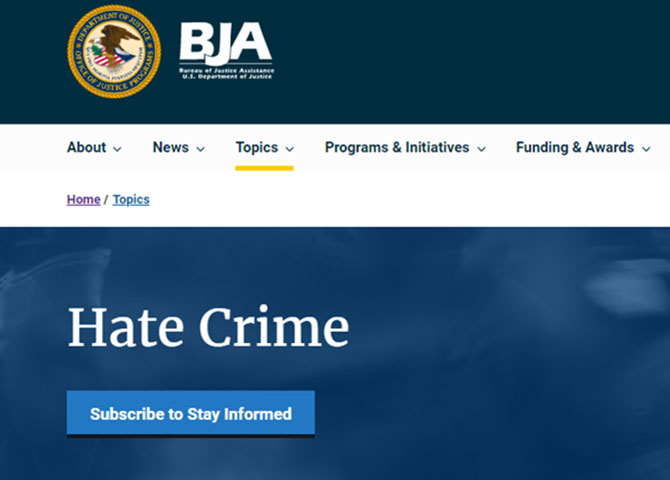
BJA Hate Crimes Resources
The Bureau of Justice Assistance (BJA) helps America’s state, local, and tribal jurisdictions reduce and prevent crime, lower recidivism, and promote a fair and safe criminal justice system. BJA provides a wide range of resources through programs and services, including training and technical assistance, to address hate crime matters.
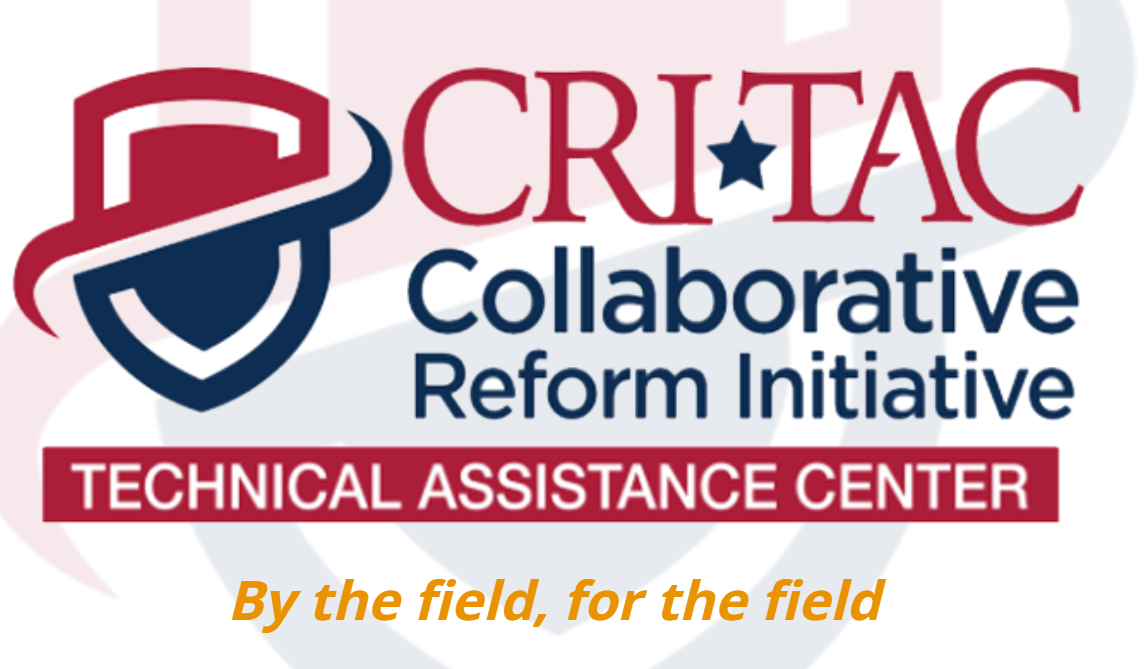
CRI-TAC Training: Hate Crimes Recognition and Reporting
This no-cost law enforcement training, provided by the COPS Office Collaborative Reform Initiative Technical Assistance Center (CRI-TAC), provides in-person hate crimes training for line-level officers and first-line supervisors to address the immediate response on the scene to potential hate or bias crimes. The training educates officers about victims, including victimology research, diverse cultures, best communication practices, interviews and social service resources. The training can be delivered as an 8-hour direct, or a 16-hour train the trainer. Agencies interested in receiving this training or any other technical assistance may visit the Collaborative Reform website and submit a request.

Overview of the Supreme Court Decision (Counterman v. Colorado)
This resource, tailored for criminal justice professionals and community partners, sheds light on the recent United States Supreme Court decision in Counterman v. Colorado, 143 S.Ct. 2106 (2023). This decision clarified that to establish a “true threat” of violence, the government must prove that “the speaker subjectively understood the threatening nature of his statements.” Id. at 2113. Proof of recklessness is the minimum mental state that will satisfy this burden. Id. Counterman v. Colorado is relevant to the enforcement of hate crimes laws because hate crimes often involve a true threat or other violent crime (e.g., assault, battery, murder, arson). Although the First Amendment to the U.S. Constitution guarantees the right to free speech, this right does not extend to true threats. This resource therefore provides an overview of the Supreme Court’s decision and its implications for the field and identifies additional resources for consideration.
PDF

Hate Crimes Laws and Policies
This U.S. Department of Justice (DOJ) page provides information on federal hate crimes laws, policies, state laws, codes, and statutes, and a table that indicates which of the bias categories included in federal hate crimes laws are included in each state’s laws.
Website

Comparing Individuals Who Engage in Violent Extremism and Similar Acts
The paper compares and contrasts data and findings from the National Institute of Justice (NIJ) –sponsored research projects on violent extremism, mass shootings, and bias crimes. The comparison examines both the content and creation/coverage of data from four research projects: the Profiles of Individual Radicalization in the United States (PIRUS) database, the Bias Incidents and Actors Study (BIAS) database, the National Hate Crime Investigation Study (NHCIS) database, and the Violence Project dataset.
PDF

FBI Releases 2023 Hate Crime Statistics
The FBI's Uniform Crime Reporting (UCR) Program collects and compiles crime data from law enforcement agencies to provide reliable information for law enforcement management. In 2023, more than 16,000 agencies submitted hate crime data, reporting 11,862 incidents involving 13,829 offenses. The data includes details on the offenses, victims, offenders, and locations of these hate crimes.
Website

CRS Toolkit: Hate Crimes Response
This CRS toolkit details CRS programs and services to help communities' problem solve and build capacity to prevent and respond to hate crimes.
PDF

DOJ Hate Crimes Resources
Access a comprehensive collection of DOJ's hate crimes resources.
Website

BJA Hate Crimes Resources
The Bureau of Justice Assistance (BJA) helps America’s state, local, and tribal jurisdictions reduce and prevent crime, lower recidivism, and promote a fair and safe criminal justice system. BJA provides a wide range of resources through programs and services, including training and technical assistance, to address hate crime matters.
Website

CRI-TAC Training: Hate Crimes Recognition and Reporting
This no-cost law enforcement training, provided by the COPS Office Collaborative Reform Initiative Technical Assistance Center (CRI-TAC), provides in-person hate crimes training for line-level officers and first-line supervisors to address the immediate response on the scene to potential hate or bias crimes. The training educates officers about victims, including victimology research, diverse cultures, best communication practices, interviews and social service resources. The training can be delivered as an 8-hour direct, or a 16-hour train the trainer. Agencies interested in receiving this training or any other technical assistance may visit the Collaborative Reform website and submit a request.
Website





